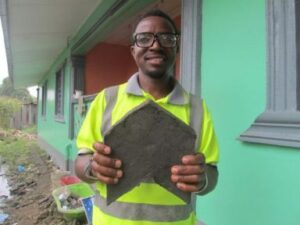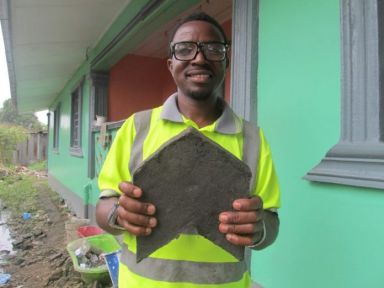MONROVIA, LIBERIA-Abraham L. B. Freeman and D. Baccus Roberts appear determined to put their country on the list of nations whose citizens ‘create’ useful products from plastic waste.

Abraham L. B. Freeman displaying one of his bricks made from waste plastic material.
Both Freeman and Baccus refer to themselves as ‘environmental health and safety advocates’.
“I’m encouraging Liberians to limit the use of plastic to save our environment,” Freeman told the Daily Observer in an interview recently at his ‘recycling’ site in Monrovia.”
He said people who go to market should use one plastic as often as possible because plastic survives more than five hundred years in the environment and degrades water resources.
“People are experiencing flooding in their various communities, because of littering plastic that goes into water resources and clog the drainage, Mr. Freeman said.
“I want to encourage Liberians and other nationals living in Liberia to limit the use of plastic because, according to research from the UN and other research organizations, plastic stays more years in our environment. They degrade our water resources; they clog our drainage and have many other negative impacts on our community,” he explained.
Environmental advocate Freeman said he is working with another person who has similar technological skills and vision.
Introducing his colleague, D. Baccus Roberts, Freeman said: “We met in Jamaica Road community on the Bushrod Island and, together, we educate residents and visitors here on the dangers of plastics.”
According to him, such education has motivated many community members who are now helping the two environmentalists to separate discarded plastic materials from their garbage, which is the people’s common contribution toward the advocates’ initiative.
“Baccus and I have started recycling waste plastic into pavement bricks in Liberia,” said Freeman.
They began their new initiative in December of 2018, following their discovery of tons of piled-up plastic wastes in communities and streets of Monrovia.
“Our first productions, bricks from waste plastics, removed more than 650 discarded plastic materials from the environment,” Mr. Freeman said.
For now, the project of turning plastic wastes into bricks is self-sponsored, Freeman said.
“Currently, only Baccus and I are sponsoring the project by putting portions of our respective salaries together, in order to procure materials that are required for producing the bricks,” Freeman said.
Their bricks have been tested in a laboratory, Mr. Freeman said. “Testing our product at a lab was to know how resistant it will be in the face of compression test and it is good to be used in construction work,” he said.
“We have prepared more than 50 bricks and this is just like a politest, we want people to know that plastic can be recycled into bricks. So we took some of the bricks that we produced and sent them out for people to view and test.”
Freeman believes that they are ready to begin mass production of their products, but currently they don’t have the resources. He said Ghana is the nearest market for bringing plastic-bricks molding machines to Liberia, and that such machines can mold these bricks with less effort and energy.
“We are appealing to Liberians and friends of Liberia to help us on purchasing these machines. We have talked to a vendor from Ghana. He gave us preliminary price of the machine. It’s in thousands of United States Dollars. We don’t have this money now. We need the machine to start producing more bricks from plastic waste in Liberia.”
According to Freeman, the recycling of plastic wastes project not only saves the environment, it provides employment for other young people in the community and their household in the community. Also, The bricks can be used to pave yards, can be used as wall, and can be used also to pave roads in other countries, he said.
“Recycling of plastic wastes in Liberia has many economic values that people can dive into. With enough research, education and information, Liberians in the public and private sectors can make massive use of plastics in Liberia,” Freeman said.

